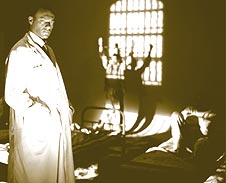I came into the world imbued with the will to find a meaning in things. . .”
Hump days are difficult—situated smack dab in the middle, doubly pressured by the beginning and the end. Perhaps, Wednesdays are the dualist’s weekday. For reasons beyond my immediate comprehension, strange, existential things that demand inquiry seem to happen on Wednesdays—at least as far as I am concerned.
. . .my spirit filled with the desire to attain to the source of the world. . .”
Last Wednesday was a particularly odd and long day. I’d finished office hours when my former student and friend, Haya, dropped by to discuss Frantz Fanon’s Black Skin, White Masks from her Post-Colonial Lit class. Admittedly, I knew very little of Fanon’s writing and embarrassingly little about post-colonial literature. But, fortunately for me, Haya has always been more of a teacher than a student.
Rapt by her synopsis of his work, I lost track of time as the clock ticked closer to 4 pm. Per my tendency, I remembered, at the last minute, my plans with another friend. I invited Haya to join me. Per her tendency, she agreed. Running incredibly late, I grabbed my two heavy-laden teaching bags and locked my office. We began the short walk to my car, descanting on the virtues of Fanon’s chapter titled, “The Fact of Blackness.”
. . .and then I found I was an object in the midst of other objects.”
We stepped off the curb and noticed a woman, several years past middle age, barreling down Maynard Street in a Jeep Grand Cherokee. She slammed her brakes and came to an abrupt stop about five feet from the crosswalk. Visibly perturbed that our crossing interrupted her speeding, she honked, flailed her hands and hurled threatening words from the safety of blue steel encasement. To heighten menace, she gradually released her brake in an intentional effort to inch closer to our bodies, as if trying to shoo deer from an intersection. As soon as my heel clicked against the asphalt’s median, my left foot less than a centimeter from her tire, she sped away. I yelled in her flight’s direction, “You saw us! We’re not invisible!”
Just as I reached the other side, I stumbled, and the movements, the attitudes, the glances of the other fixed me there.”
Haya was quiet when we stepped onto the opposite curb. I was still fuming when a much older man balanced by a cane, a witness to the scene, approached us. He looked us up and down, paused then offered, “We don’t yell in Ann Arbor.” Haya respectfully asked him to repeat himself because he spoke as a man whispering secrets. He repeated, again, barely above a whisper, “We don’t yell in Ann Arbor.” Even though I heard him the second time, I asked him to repeat once more because I wanted him to hear himself—not that it mattered. He said it again. Haya looked at me with widened eyes as she adjusted her hijab. I countered him before turning away toward the garage elevator, “Congratulations, you don’t yell! We aren’t you!”
Then, as now, I don’t know if he responded.
I was told to stay within bounds, to go back where I belonged.”
We sat in my car for a short while before I turned the ignition. We needed to gather ourselves, to make some dumb sense of what just happened. We needed a moment, or a long lifetime, to figure out how beings think and move.
“Haya, I’m sorry you saw me lose my temper. I suppose the older woman using her car as a weapon wasn’t the thing that bothered me most. It was the older man who thought it was okay to admonish the wrong people—as if my protective response of yelling at a threatening woman was an inappropriate one.”
“Yes, totally understandable. But, Dee, did you notice how he looked at my hijab and our brown skin and assumed we weren’t from Ann Arbor?”
“I did. We’re not. But, I agree, how would he know that?. . .and would he have scolded a man?. . .and would he have made that assumption of another white man?”
I felt my voice grow hoarse like I’d been shouting down ghosts in a tunnel. A familiar rage crept up the back of my neck. I turned the ignition, backed out, paid and exited.
Everything is anticipated, thought out, demonstrated, made the most of. My trembling hands take hold of nothing; the vein has been mined out.”
We ordered tapas at the restaurant while I recounted the event to my friend, Derrick. He listened with the sympathetic attention of a fellow sojourner who knew the burden of parsing other people’s complicated motivations. He nodded and low sighed. There was nothing new to add. This was nothing new.
From time to time I would like to stop. To state reality is a wearing task. But, when one has taken it into one’s head to try to express existence, one runs the risk of finding only the non-existent.”
“It’s possible I overreacted,” I offered as I dug through my purse trying to find a lozenge for my closing, sore throat. “It’s just tiring. It’s like walking through life as a ghost and banging pots to let people know you’re still here—fighting nothingness.”
Haya posited, “Or, maybe, it’s what Fanon wrote: ‘straddling nothingness and infinity.’ Maybe the struggle will always be dual—battling invisibility and hyper-visibility.”
“Battling being a ghost and a giant.”

